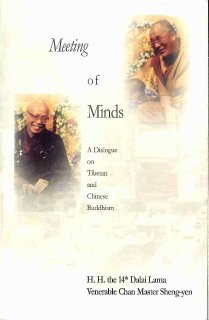
 After the Four Noble Truths, the next Buddhist book that I read is Meeting of Minds: A dialogue on Tibetan and Chinese Buddhism by H.H. the 14th Dalai Lama and Venerable Chan Master Sheng-yen, Dharma Drum Publications, 1999.
After the Four Noble Truths, the next Buddhist book that I read is Meeting of Minds: A dialogue on Tibetan and Chinese Buddhism by H.H. the 14th Dalai Lama and Venerable Chan Master Sheng-yen, Dharma Drum Publications, 1999.Before this, I’ve skimmed several of the books by His Holiness that deal with happiness in the work place, catching a glimpse of Tibetan Buddhism in the process. I also had a cursory read of several Chinese Buddhist texts on Chan Buddhism by Venerable Master Sheng-yen.
However, to read about their one-on-one interaction, that’s more than a pleasant surprise. The dialogue is part of the Dharma event In the Spirit of Manjushri: the Wisdom Teachings of Buddhism held in NY on May 1 – 3, 1998.
The book is a concise account of the proceeding of the dialogue, during which the two protagonists, steeped in the teachings of the respective schools of Buddhism, discussed the transformation of mind that “focused on the connection between kleshas (mental afflictions), meditation practice, and the experience of enlightenment.”
Along the way, it was made clear that “there is no real contradiction between the sudden and gradual approaches [to enlightenment]. The differences lie in the dispositions of the practitioners.” In everyday parlance, these would correspond to the fast and slow learners amongst us. Some can make the mental connection on the spot, spontaneously, simultaneously, and instantaneously, while others have to slog, labor, and agonize before seeing the light.
As reported, “His Holiness and Venerable Sheng-yen also clarified some common misconceptions held by the Chinese and Tibetan traditions. Chinese Buddhism often believes that Tibetan Buddhism emphasizes “esotericism,” and Tibetan Buddhism often believes that theirs is the most “complete” Buddhist teaching.”
I’m particularly guilty of the first myth, the being esoteric part, no thanks to the exposure I self-imposed through reading the various Chinese martial arts novels that often shroud Tibetan monks in enigma with mystic powers. Of course I’ve realized that reality is an entirely different matter long before I know of His Holiness.
As noted in the Forward by Venerable Guo-gu Bhikshu, “this dialogue between two Buddhist masters symbolizes the commonality between all Buddhists paths of awakening and it celebrates the meeting of two great minds. We hope that their meeting and this book will initiate further exchanges and cooperation between these two great traditions.”
By extension, we also hope that this intra-faith dialogue can be widened to inter-faith discourse, thereby facilitating unity at the global level where peace and harmony will prevail.
The pleasant surprise did not stop at what the book conveys, but also what the book physically contains.
Toward the middle of the book, a bookmark suddenly fell out from the book. Stamped “Read and Release” at the bottom, it is from BookCrossing.com with the tagline “the karma of literature.” How quaint, a Buddhist term used by a dotcom company found in a Buddhist book.
More pleasant surprises awaited at the website. First, I learned that unlike, road crossing, bridge crossing, or any other type of crossing, bookcrossing is “the practice of leaving a book in a public place to be picked up and read by others, who then do likewise.” Unless one finds it too good a find to let go, I hasten to add.
Reading on and learning more, the website welcomes you to “our book-lovers' community. Our members love books enough to let them go — into the wild — to be found by others. Sharing your used books has never been more exciting, more serendipitous, than with BookCrossing. Our goal, simply, is to make the whole world a library. BookCrossing is a free online book club of infinite proportion, the first and only of its kind. Inside, you'll find millions of book reviews and hundreds of thousands of passionate readers just like you.
Let's get right down to it. You know the feeling you get after reading a book that speaks to you, that touches your life, a feeling that you want to share it with someone else? BookCrossing.com gives you a simple way to share books with the world, and follow their paths forever!”
How? Just follow the "3 Rs" of BookCrossing, Read, Register and Release (refer to the website for more details, but I think they are self-explanatory enough).
This is like meshing TheLibraryThing and Geocaching, two things that I’ve blogged previously. I’m instantly sold, and signed up immediately.
From the journal entry, I learned that this book that I’ve had the pleasure of reading was “released” on July 3 this year by a person from Miami, and I’m (or rather my wife is) the first finder. The person has left the book at the Ramadan Inn, Orlando where we have attended a Buddhist Camp this summer. I left a journal post as well, giving my impression of the book.
To release or not to release? The book I mean. That’s the question I need to ponder now. On one hand, the book is full of wisdom, and can serve as a ready source of reference. On the other hand, keeping the book runs counter to the spirit of sharing a book, which as members of the BookCrossing.com we should subscribe to. What about “not grasping”, the Buddhist teaching that was the gist of my other blog?
Well, I just have to find a fun way to re-release the book. Any suggestion, other than those already listed at the website (give it to a friend, leave it on a park bench, donate it to charity, "forget" it in a coffee shop, etc.)?

No comments:
Post a Comment